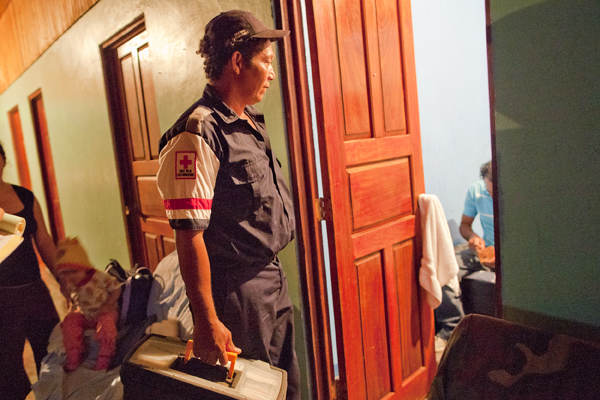
Photo by Adam Dietrich
The Red Cross in Nosara is the only medical ground transportation that expats have but Red Cross services are limited.
Sixty expatriate residents from the Nosara area attended an Emergency Medical Services Information meeting sponsored by private Doctors Mauricio Jimenez and Alejandro Gutierrez at Marlin Bill’s on Tuesday, February 12th. The presentation was organized by Jimenez and 10 year resident Susan Loudenslager, who said this was a first time event.
Jimenez explained the motivation for organizing the meeting. “Dr. Alejandro and I have had a lot of issues with insurance companies after people have had emergencies. But services have to be paid for, of course,” he said. “Our interest is in making it easier for everyone,” to get the care they need and not have to hassle with the insurance company later, Jimenez said.
At the meeting, Jimenez presented a basic overview of medical care in Costa Rica. All employed citizens receive care through the Caja government based social security and medical care system. Expats must access private doctors and hospitals and won’t be served at a government hospital, such as the one in Nicoya, unless it is an extreme emergency.
For an expat to get emergency care or air evacuation services, Jimenez told the group, they need to have at least one of two things available during the emergency—cash or a credit card with greater than $1,500 available. Most North American and European insurance companies require at least 48 hours for approval of any service, he said. “You will have to pay up front for the service and you may or may not get reimbursed later,” Jimenez explained.
After the trauma, in order to be able to get reimbursed from a medical plan, expatriates will need either: an international medical care plan; or a home country plan with airlift coverage included; or coverage from INS or other Costa Rican based insurance companies which includes airlift and emergency care. In response to questions, Jimenez outlined that emergency air transport could cost up to $5,000 for a plane or $8,000 for helicopter, depending on the amount of specialized equipment and personnel required.
Jimenez stated that he, Gutierrez, and Dr. Kattia Porras, the other local private doctor, have a network of service providers in the hospitals and air transport companies. “Our estimated time to get you to a hospital in San Jose via air transport in the event of an extreme emergency is 1 ½ hours after we get the call,” said Jimenez. “The most important thing is to call one of us immediately if there is an injury or trauma. Severe broken bones, heart attacks or major car accident injuries will need to be transported out of Nosara,” he said.
Jimenez and Gutierrez at Paradise Medical Services are developing a database of all local residents who wish to have their basic medical history, emergency contact and insurance information on file with a local provider.
“The database was Susan’s idea and we think it is a good one,” said Jimenez.
“The biggest thing everyone needs to know”, Loudenslager emphasized, “is they need to look into their insurance coverage and get all the information ahead of time. Before an emergency.”
In addition to the Paradise Medical Services doctors in Guiones and Dr. Porras, located on the Del Mar Academy road, the only other local care option for non citizens is the Red Cross, next to the airport. The Red Cross can provide basic care for citizens, residents and visitors, and only accepts donations. The Red Cross also operates the only ambulance in the Nosara area but it includes only basic instruments and equipment. “They do not have heart monitors,” Jimenez said.
Medical Contacts Information: see attached info sheet handed out at the meeting.
| 
